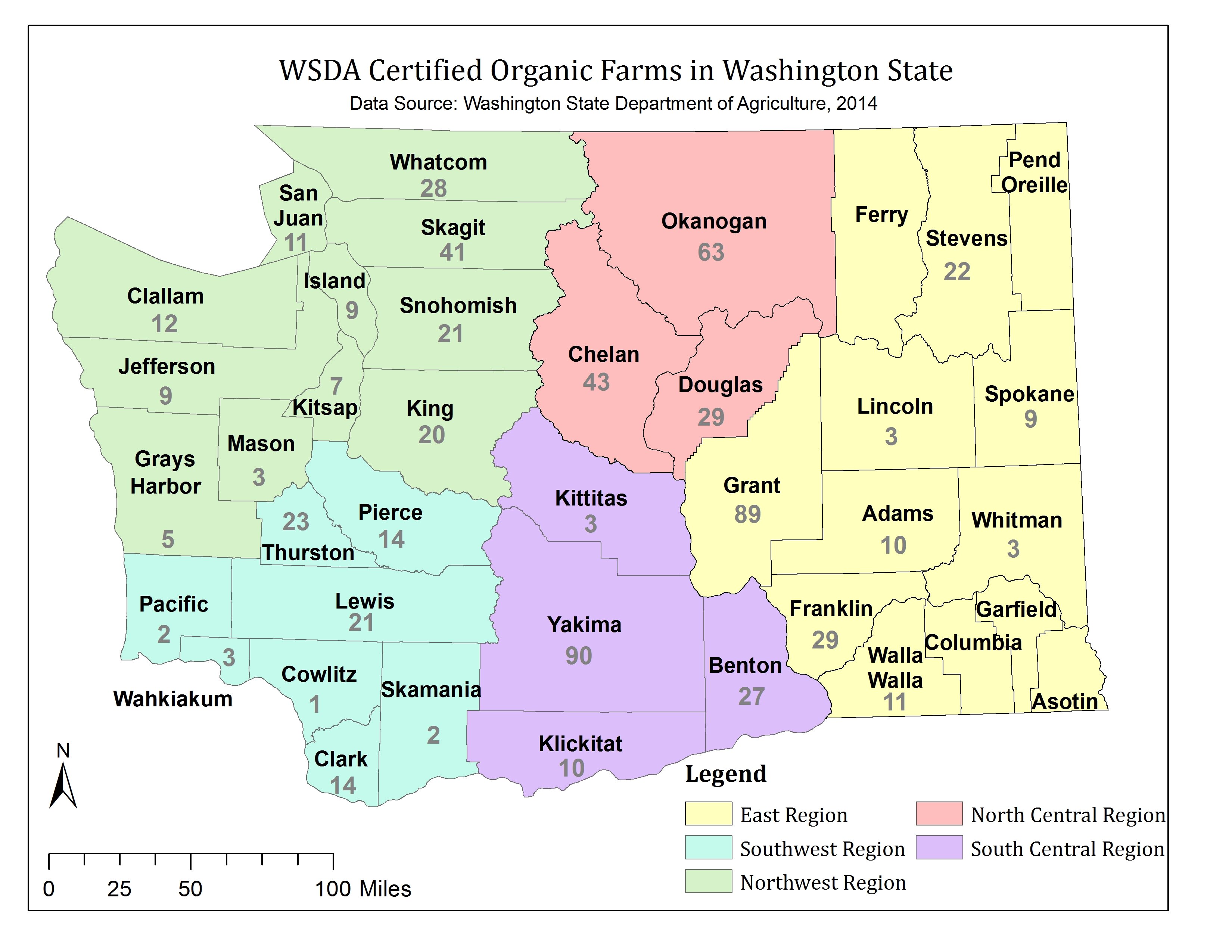The dry high mountain valleys east of the Cascades present a stark contrast to the lush maritime lowlands west of the mountains. Here the bright sun, rich alluvial soils and ample irrigation water combine to create one of the world’s most productive regions for premium tree fruit and a wide variety of herbs and vegetables.

East of the Cascades isn’t called the “Dry Side” for nothing. It gets hot here! Average summer highs are in the high 80s to low 90s, with up to 200 sunny days per year. Rainfall ranges from 40 to 60 inches along the eastern slope of the mountains to as low as 10 inches per year in the river valleys. Blocked by the Cascades from the moderating effects of the ocean, winters can get very cold, with deep snows and average daytime highs below freezing.
The region’s valleys were carved by the Chelan, Columbia, Entiat, Methow, Okanogan, and Wenatchee rivers. Although fewer in number than at the height of the area’s apple boom, fruit orchards still cling to the hillsides around the southern end of Lake Chelan, Washington’s largest lake. Cattle graze higher slopes too steep or rocky for crop production.
North Central Washington has 133 certified organic farms with a total of 7,841 acres of land in organic production. The chart shows the number of certified organic farms and acreage in organic production for each county.
According to the most recently available sales data, in 2011 certified organic farmers in Chelan, Douglas and Okanogan counties generated $41.7 million in sales. The majority of the region’s organic tree fruits are sold wholesale to packing houses. An increasing number of orchardists, however, are crossing the mountains to get top dollar by selling directly to consumers at urban farmers markets.
Apples are king in this region, and Washington is the #1 producer of certified organic apples. Although many farmers continue to grow Red and Golden Delicious apples, are being replaced by several popular new varieties, including Braeburn, Cameo, Fuji, Gala, Ginger Gold, Honey Crisp, and Pink Lady. Other new varieties growers are experimenting with include Ambrosia, Corail, Pinova, Tosca, Sweetango, and Zestar.
While there’s strong demand for new apple varieties, some organic orchardists continue to grow heirloom varieties such as Arkansas Black, Ashmead Colonel, Cox’s Orange Pippin, Empire, Gravenstein, Jonathan, McIntosh, Northern Spy, Spitzenburg, and Winesap.
Pears are another major crop for organic growers in the region, including Bartlett, Bosc, Comice, Cortland, D’Anjou, Seckel, and White Doyenne.
Some of the world’s most luscious stone fruits also thrive here, including apricots, nectarines, peaches, pluots and plums. And some farmers are experimenting with growing fruits associated with warmer parts of the country, including Kiwi, Jujube, Pawpaw, and American persimmons.
The eastern slopes of the Cascades are also prime for cherries, where varieties are selected for growing in selected micro-climates at higher elevations to extend the growing season. Popular varieties include Bing, Black Republican, Chelan, Danube, Lapin, Rainier, Skeena, Staccato, Sweetheart, and Van.
Berries also thrive on farms and homesteads throughout the area: Blueberries, Boysenberries, Currants, Gooseberries, Raspberries, and Strawberries. Some growers are also planting Honeyberries, Jostaberries, and Sea Buckthorn (an Eastern European fruit becoming increasingly popular for juices).
Although our state’s primary grape growing areas are further south, farmers in the North Central region grow table grapes and select wine grapes, including Cabernet, Chardonnay, Chenin Blanc, Gewurztraminer, Grenache, Mueller Thurgeau, Pinot Noir, Sauvignon Blanc, Syrah, and White Reisling.
This also isn’t the state’s primary grain region, but several farmers are growing organic barley, buckwheat, flax, oats, rye, triticale, and white and hard red winter wheats. Emmer farro, an ancient grain grown by Bluebird Grain Farm in the Methow Valley, has become a hit in Seattle restaurants.
Okanogan County’s hot, dry summers have made the area prime for garlic seed production. Organic farmers in the region—especially those that sell on the farm or directly through CSAs or farmers markets—grow an abundance of premium vegetables, including artichokes, asparagus, broccoli, cucumbers, culinary and medicinal herbs, eggplant, fennel, flowers (both ornamental and edible), green and dry beans, onions, melons, peppers, rhubarb, summer and winter squash, sweet corn, and some of the world’s juiciest tomatoes.
Source: WSU CSANR
Learn about Tilth Producers member farms listed in our directory
North Central Washington Farm Profile – Brownfield Orchard
Resources for Organic Farming
in North Central Washington
Buy Local in the Methow Valley
Cascade Foothills Farmland Association
Community Farm Connection
EAT Local in North Central Washington
IRIS: Initiative for Rural Innovation & Stewardship
North Central Washington Food System Assessment
Okanogan Producers Marketing Association
Washington Apple Country
WSU Tree Fruit & Extension Center



